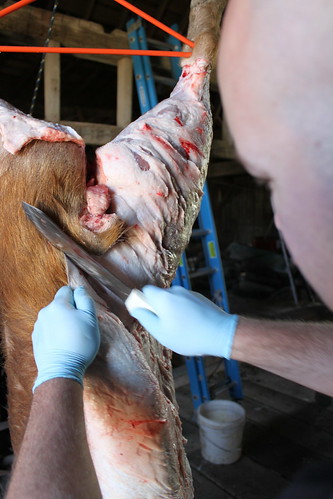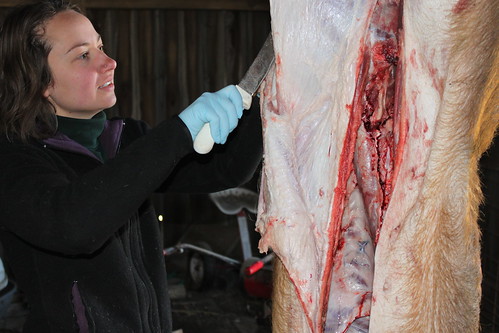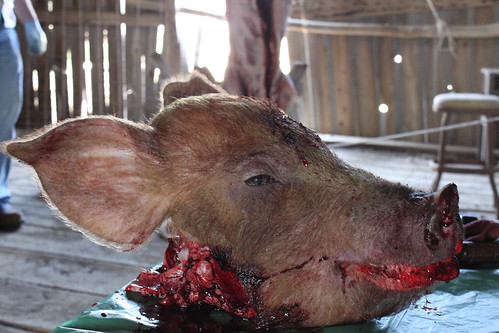 Meet Red. She's the pig we slaughtered last Saturday with the able assistance of another meat lover, JR, and Red's owner, Denise of 2Silos farm. Earlier I published why we wanted to slaughter a pig.
What follows is a factual account of how we humanely harvested this meat animal. It was hard manual labor that we attended to with reverence for the life we took.
Meet Red. She's the pig we slaughtered last Saturday with the able assistance of another meat lover, JR, and Red's owner, Denise of 2Silos farm. Earlier I published why we wanted to slaughter a pig.
What follows is a factual account of how we humanely harvested this meat animal. It was hard manual labor that we attended to with reverence for the life we took.
I have included pictures to illustrate exactly what happened. Some readers may find this subject and the photographs graphic. If that's the case for you, you might want to wait to read a reflective and less intense post I will publish next week. Intrepid readers, keep on.
We arrived at 2Silos farm early Saturday morning. We met Denise's pigs and plethora of chickens, sheep, and geese housed in and around her gorgeous two siloed barn.
Red was allowed out of her pen and into the chicken yard. She was wiley and escaped for a quick jaunt around the farmyard before we corralled her back into the pen. The plan was to shoot her centrally between the ears and eyes to instantly stop brain function. Alex, who won a marksmanship award while in Army Basic Training, manned the 22 long rifle. He took his time to corner and aim because a miss would cause the animal to suffer unnecessarily.
 The kill shot was perfect. Red fell with not so much as a peep. She convulsed involuntarily for about a minute as all large animals do.
The kill shot was perfect. Red fell with not so much as a peep. She convulsed involuntarily for about a minute as all large animals do.
We loaded her 250 pounds into a wheeled cart and pushed it up the hill into the barn. After several attempts, we finally strung her up by her ankles over a roof beam.
 Denise felt for the juglar and cut a slit in the throat to drain the blood. The blood was drained into a sterile bucket so that it could be used in making blood sausage.
Denise felt for the juglar and cut a slit in the throat to drain the blood. The blood was drained into a sterile bucket so that it could be used in making blood sausage.
 It took nearly a quarter hour to capture the blood. When the stream finally slowed to a drop a minute, we moved on to gutting.
It took nearly a quarter hour to capture the blood. When the stream finally slowed to a drop a minute, we moved on to gutting.
 Denise ran a sharp knife carefully through the center line. She was aiming for just through the skin but accidentally made a small cut into the small intestine. Small intestine contents smell and are a source of bacteria so we worked quickly to clean up the mess and remove the guts.
Denise ran a sharp knife carefully through the center line. She was aiming for just through the skin but accidentally made a small cut into the small intestine. Small intestine contents smell and are a source of bacteria so we worked quickly to clean up the mess and remove the guts.
 We discarded the intestines. Though they can be used for sausage casing, we had neither the skill nor time to process the intestines as carefully as is required for use. Other organs (liver, kidneys, pancreas, heart) were reserved for offal recipes.
We discarded the intestines. Though they can be used for sausage casing, we had neither the skill nor time to process the intestines as carefully as is required for use. Other organs (liver, kidneys, pancreas, heart) were reserved for offal recipes.
Alex cut around the anus so that the colon, uterus, bladder, and connective tissue could be removed.
 Then skinning began from the legs down. We took turns running sharp knives halfway between the skin and meat so as to retain as much fat as possible. It took almost 45 minutes to completely skin the pig.
Then skinning began from the legs down. We took turns running sharp knives halfway between the skin and meat so as to retain as much fat as possible. It took almost 45 minutes to completely skin the pig.

Another option is to place the carcass in boiling water, scrape off the hair, and retain the hide for leather making. Denise did not have the facilities for this process and we did not have an interest in curing the skin, so we discarded it in the way described above.

When the pig was finally skinned, Alex sawed off the head. JR kept the head for head cheese making, giving Alex a jowl for guanciale (a cured dried bacon, similar to pancetta).
Denise and Alex then sawed through the backbone to split the pig into two halves.

The halves were rinsed with fresh water. From there, JR and Alex cut the pieces into appropriate primal cuts and packed them in ice filled coolers.
 We carted the coolers home for further processing. Alex butchered while I ran the Foodsaver, resulting in a freezer full of honestly raised honorably killed pork. The belly, jowl, and ham were kept fresh for curing and smoking. If y'all make a fuss in the comments we can write more about the exact cuts we made and how we plan to use the parts of the animal.
We carted the coolers home for further processing. Alex butchered while I ran the Foodsaver, resulting in a freezer full of honestly raised honorably killed pork. The belly, jowl, and ham were kept fresh for curing and smoking. If y'all make a fuss in the comments we can write more about the exact cuts we made and how we plan to use the parts of the animal.

There you have it, the story of Red's end. The experience was profound and fascinating. Please return next week for our reflection on how it felt to slaughter a pig and the implications of doing so.
Due to overwhelming response, I'm linking this to April 23rd's Food Renegade Fight Back Friday.
